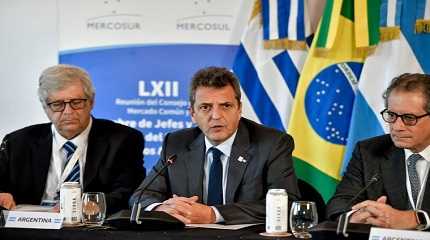
PUERTO IGUAZU (Argentine), July 5 (NNN-MERCOSUR) — Argentina Economy Minister Sergio Massa said during a conference with his Mercosur peers on the opening day of the bloc’s 62nd Summit in the province of Misiones, that “in order to strengthen intra-Mercosur trade, it is essential to consolidate local currency agreements among our countries.”
Massa, one of the leading candidates to become Argentina’s president by the end of the year, insisted on “coordinating the use of local currencies in trade within the bloc.”
He made those remarks alongside Secretaries Gabriel Rubinstein (Economic Policy) and Marco Lavagna (International Economic and Financial Affairs), together with Central Bank (BCRA) President Miguel Pesce and other officials.
Massa, who chaired the meeting of Mercosur economy ministers, argued that “beyond the moment of crisis that Argentina is going through with the worst drought in history, the use of local currencies in bilateral trade relieves the pressure on the use of reserves and on the exchange rate issue.”
He also focused on “the macroeconomic convergence and common currency and the agenda for the improvement of the payment systems as an instrument for the use of local currencies” in a bloc where trade is carried out in US dollars. Massa’s idea is to seek instruments that “avoid being hostage to external shocks”.
With wider use of Chinese yuans, the Argentine Government has been trying to stop the outflow of dollars, since the BCRA’s net reserves are believed to be about US$ 5 billion in the red.
Since 2008 there has been a mechanism for the payment of commercial transactions between Mercosur partners without using dollars for a period of up to 360 days. In January, an agreement was reached with Brazilian President Luiz Inácio Lula da Silva to extend this system, but its use is still limited.
Brazil’s financing is another pending issue. Due to internal pressure, Lula outsourced it to the new BRICS bank, which will define in August if it will incorporate Argentina, which would require the South American country to make a capital contribution.




